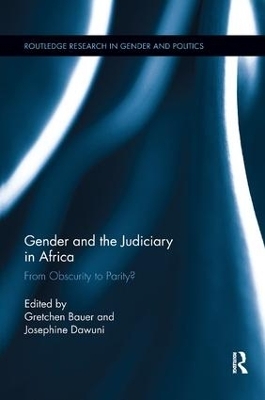
Gender and the Judiciary in Africa
Routledge (Verlag)
978-0-8153-7055-0 (ISBN)
Between 2000 and 2015, women ascended to the top of judiciaries across Africa, most notably as chief justices of supreme courts in common law countries like Ghana, Nigeria, Sierra Leone, Gambia, Malawi, Lesotho and Zambia, but also as presidents of constitutional courts in civil law countries such as Benin, Burundi, Gabon, Niger and Senegal. Most of these appointments was a "first" in terms of the gender of the chief justice. At the same time, women are being appointed in record numbers as magistrates, judges and justices across the continent. While women’s increasing numbers and roles in African executives and legislatures have been addressed in a burgeoning scholarly literature, very little work has focused on women in judiciaries. This book addresses the important issue of the increasing numbers and varied roles of women judges and justices, as judiciaries evolve across the continent.
Scholars of law, gender politics and African politics provide overviews of recent developments in gender and the judiciary in nine African countries that represent north, east, southern and west Africa as well as a range of colonial experiences, postcolonial trajectories and legal systems, including mixes of common, civil, customary, or sharia law. In the process, each chapter seeks to address the following questions:
What has been the historical experience of the judicial system in a given country, from before colonialism until the present?
What is the current court structure and where are the women judges, justices, magistrates and other women located?
What are the selection or appointment processes for joining the bench and in what ways may these help or hinder women to gain access to the courts as judges and justices?
Once they become judges, do women on the bench promote the rights of women through their judicial powers?
What are the challenges and obstacles facing women judges and justices in Africa?
Timely and relevant in this era in which governmental accountability and transparency are essential to the consolidation of democracy in Africa and when women are accessing significant leadership positions across the continent, this book considers the substantive and symbolic representation of women’s interests by women judges and the wider implications of their presence for changing institutional norms and advancing the rule of law and human rights.
Gretchen Bauer is professor of political science and international relations at the University of Delaware, USA. Her current research focuses on women’s political leadership in sub-Saharan Africa. She is the co-editor with Manon Tremblay of Women in Executive Power: A Global Overview (2011) and with Hannah Britton of Women in African Parliaments (2006). Josephine Dawuni is an assistant professor of political science at Howard University. Her current research focuses on women and the judiciary in sub-Saharan Africa.
Foreword Judge Mabel Agyemang 1. Gender and the Judiciary in Africa-An Introduction Josephine Dawuni 2. Egypt: The Lingering Battle for Female Judgeship Mahmoud Hamad 3. Botswana: Delayed Indigenization and Feminization of the Judiciary Gretchen Bauer and Rachel Ellett 4. South Africa: a Transformative Constitution and a Representative Judiciary Cathi Albertyn and Elsje Bonthuys 5. Nigeria: Women Judges Enhancing the Judiciary Hauwa Ibrahim 6. Tunisia: A New Constitution and More Women Judges Salsabil Klibi 7. Tanzania: Women Judges as Agents of Judicial Education Mi Yung Yoon 8. Benin: Women Judges Promoting Women’s Rights Alice Kang 9. Ghana: the Paradox of Judicial Stagnation Josephine Dawuni 10. Rwanda: Balancing Gender Quotas and an Independent Judiciary Jean-Marie Kamatali 11. Gender and the Judiciary in Africa: Conclusion Gretchen Bauer
| Erscheinungsdatum | 07.11.2017 |
|---|---|
| Reihe/Serie | Routledge Research in Gender and Politics |
| Zusatzinfo | 13 Tables, black and white; 8 Line drawings, black and white; 8 Illustrations, black and white |
| Verlagsort | New York |
| Sprache | englisch |
| Maße | 152 x 229 mm |
| Gewicht | 299 g |
| Themenwelt | Recht / Steuern ► Allgemeines / Lexika |
| Recht / Steuern ► Arbeits- / Sozialrecht ► Sozialrecht | |
| Recht / Steuern ► EU / Internationales Recht | |
| Recht / Steuern ► Privatrecht / Bürgerliches Recht ► Berufs-/Gebührenrecht | |
| Sozialwissenschaften ► Politik / Verwaltung ► Politische Theorie | |
| Sozialwissenschaften ► Soziologie ► Gender Studies | |
| Sozialwissenschaften ► Soziologie ► Spezielle Soziologien | |
| ISBN-10 | 0-8153-7055-5 / 0815370555 |
| ISBN-13 | 978-0-8153-7055-0 / 9780815370550 |
| Zustand | Neuware |
| Informationen gemäß Produktsicherheitsverordnung (GPSR) | |
| Haben Sie eine Frage zum Produkt? |
aus dem Bereich


